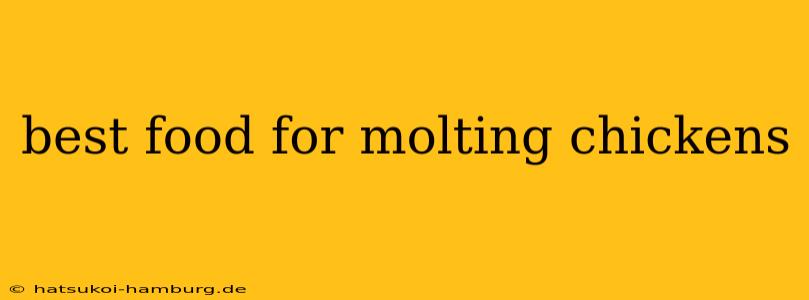Molting is a natural process for chickens, but it can be stressful on their bodies. Providing your flock with the best food during this time is crucial for supporting their health and ensuring a beautiful, healthy new set of feathers. This comprehensive guide will walk you through everything you need to know about feeding your chickens during their molt.
Understanding the Molting Process
Molting is when chickens shed their old feathers and grow new ones. This typically happens once a year, though some breeds may molt twice. During this time, chickens need extra nutrients to support feather regrowth. They often appear less active and their egg production may decrease or even stop completely.
The molting process requires significant energy and resources from the chicken. Providing proper nutrition helps reduce stress and ensures a smoother transition.
Nutritional Needs During a Molt
To support healthy feather growth, your molting chickens need a diet rich in:
Protein
- Protein is essential for feather growth. Increase protein levels slightly during a molt. Good sources include:
- Commercial Layer Feed: A high-quality layer feed is a good base. Look for one with at least 16% protein.
- Meat Scraps: Cooked, boneless meat scraps (chicken, beef, etc.) can be added in moderation.
- Insects: Chickens love bugs and mealworms, which are great sources of protein and other nutrients.
Amino Acids
- Specific amino acids, like methionine and cysteine, are building blocks of keratin, the protein that makes up feathers. Consider supplementing with a commercially available amino acid blend if you are concerned about deficiencies.
Minerals
- Minerals, particularly calcium and phosphorus, are crucial for strong feathers and overall health. Good sources include:
- Oyster Shell: Provides calcium, which is essential for both feather growth and eggshell formation.
- Grit: Helps with digestion and nutrient absorption.
Vitamins
- Vitamins A, D, and E are vital for feather growth and immune system support during this stressful time. A good quality layer feed should provide adequate levels, but you can supplement with added vitamins if needed (always follow the directions). Consult your veterinarian for advice.
Best Foods to Feed Molting Chickens
Here’s a breakdown of excellent food choices for your molting hens:
High-Quality Layer Feed
The foundation of your molting chicken's diet should be a commercially formulated layer feed. Look for feeds specifically designed for laying hens as these usually provide the necessary nutrients for feather growth.
Supplemental Protein Sources
Supplement the layer feed with additional protein sources like:
- Cooked eggshells (finely crushed)
- Black soldier fly larvae
- Sprinkled cheese
Healthy Treats
Offer treats in moderation. Some excellent options include:
- Chopped vegetables (carrots, spinach, kale)
- Fruits (berries, apples, melon – in small quantities)
- Mealworms
Avoid Processed Foods
Limit or avoid processed foods, sugary treats, and anything that may upset their digestive systems during this already stressful time.
How to Supplement Your Chickens' Diet During Molting
Start providing supplemental food a few weeks before you expect the molt to begin. Gradually introduce new foods to avoid digestive upset.
Observe your chickens closely. If they seem unwell or the molt is unusually prolonged, consult a veterinarian. They can assess the situation and recommend the best course of action.
Signs Your Chickens Need More Nutrients
Keep an eye out for these signs that indicate your hens need a nutritional boost during their molt:
- Slow feather regrowth
- Dull or brittle feathers
- Listlessness or lack of energy
- Pale combs and wattles
Conclusion: Healthy Molting, Happy Hens
By providing your chickens with a balanced diet rich in protein, amino acids, minerals, and vitamins during their molt, you can ensure a healthy and successful feather regrowth. Remember to monitor their condition closely and adjust their diet accordingly. Healthy molting leads to healthy, happy hens and bountiful egg production in the future!
